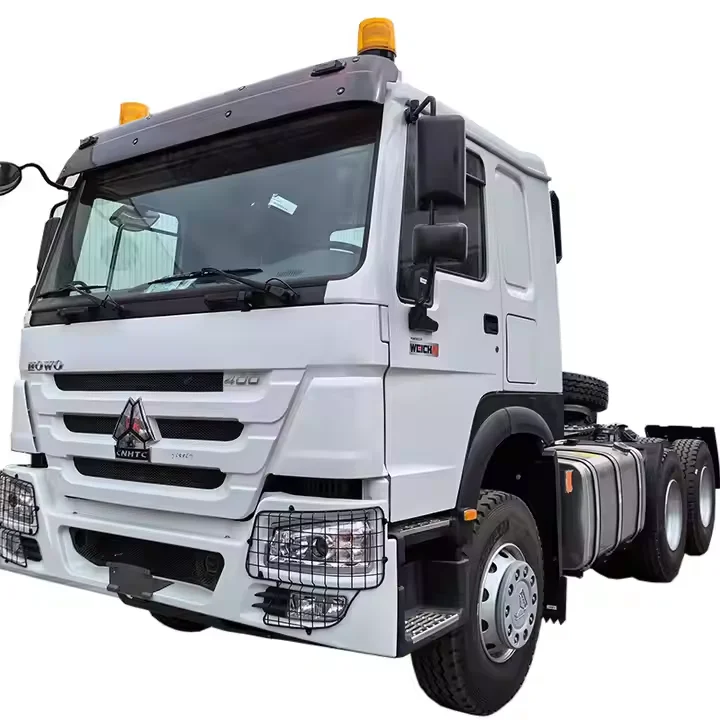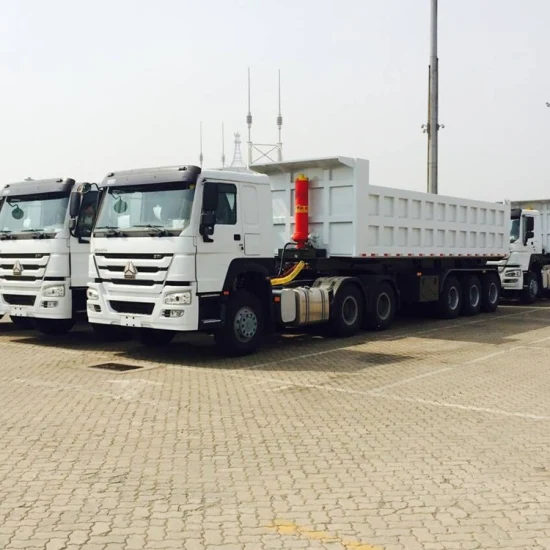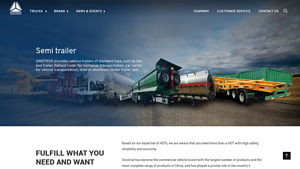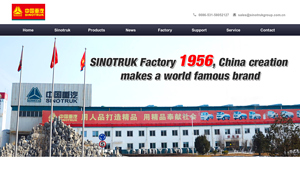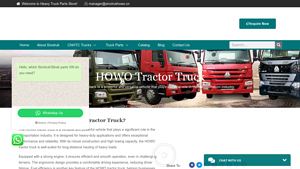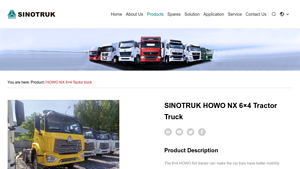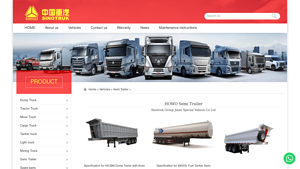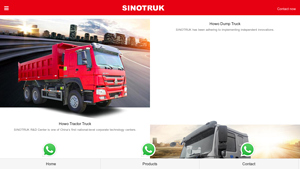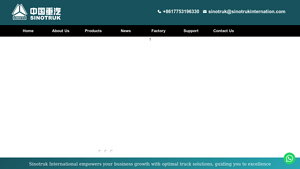Introduction: Navigating the Global Market for sinotruk Tractor Trailer Truck
In the increasingly competitive landscape of global logistics, sourcing reliable sinotruk tractor trailer trucks can pose significant challenges for international B2B buyers. As businesses in regions such as Africa, South America, the Middle East, and Europe (notably Brazil and Saudi Arabia) strive to enhance their transportation efficiency, understanding the nuances of these heavy-duty vehicles is paramount. This guide is designed to empower you with the essential insights needed to navigate the complexities of purchasing sinotruk tractor trailer trucks.
Covering a comprehensive range of topics, this guide delves into various types of sinotruk tractor trailers, including low bed, flatbed, and tanker models, each tailored for specific applications. We will also explore the critical aspects of supplier vetting, ensuring you choose trustworthy manufacturers who meet quality and compliance standards. Cost considerations and value assessment will be thoroughly examined to help you make informed purchasing decisions that align with your operational budgets and logistics requirements.
With this resource at your disposal, you will be equipped to tackle the challenges of sourcing sinotruk tractor trailer trucks confidently. By leveraging the knowledge within this guide, you can enhance your procurement strategy, ensuring that your fleet meets the demands of modern logistics while contributing to your overall business success.
Understanding sinotruk Tractor Trailer Truck Types and Variations
| Type Name | Key Distinguishing Features | Primary B2B Applications | Brief Pros & Cons for Buyers |
|---|---|---|---|
| Low Bed Semi Trailer | Low profile for easy loading of heavy machinery; high load capacity. | Transporting construction equipment and heavy goods. | Pros: Ideal for oversized loads; Cons: Higher initial investment. |
| Flatbed Semi Trailer | Versatile design for various cargo types; open platform. | General freight, container transport. | Pros: Flexible loading options; Cons: Limited protection from elements. |
| Fuel Tanker Semi Trailer | Specialized for liquid transport; available in various materials. | Fuel distribution and chemical transport. | Pros: Customizable; Cons: Requires compliance with safety regulations. |
| Fence Semi Trailer | Strong carrying capacity with protective fencing; robust structure. | Transporting machinery and bulk goods. | Pros: Enhanced safety for cargo; Cons: May require additional securing methods. |
| Sidewall Semi Trailer | Drop side design for easy access; suitable for bulk cargo. | Logistics and construction industries. | Pros: Efficient loading/unloading; Cons: Less secure for loose items. |
What Are the Characteristics of Low Bed Semi Trailers?
Low bed semi trailers are designed specifically for transporting heavy and oversized machinery, including construction equipment and large vehicles. Their low profile allows for easy loading and unloading, minimizing the incline angle of ramps. With a standard load capacity of up to 80 tons, these trailers can handle substantial weight, making them essential for industries requiring heavy transport solutions. Buyers should consider the trailer’s dimensions and weight distribution capabilities to ensure compatibility with their specific transport needs.
How Do Flatbed Semi Trailers Meet Diverse Cargo Needs?
Flatbed semi trailers offer a versatile platform suitable for transporting various cargo types, including containers and bulk goods. Their open design facilitates easy loading and unloading from all sides, making them ideal for logistics operations that require flexibility. However, buyers should be aware that flatbeds provide limited protection from environmental factors, which may necessitate additional tarping or securing measures for sensitive cargo. The adaptability of flatbeds makes them a popular choice for businesses involved in diverse transportation sectors.
What Makes Fuel Tanker Semi Trailers Essential for Liquid Transport?
Fuel tanker semi trailers are specialized vehicles designed for the safe and efficient transport of liquids, including fuels and chemicals. Available in various materials such as aluminum and stainless steel, these trailers can be customized to meet specific industry requirements. B2B buyers should consider regulatory compliance and safety features, as transporting hazardous materials involves stringent guidelines. The ability to tailor tanker trailers for specific needs enhances their utility in sectors like fuel distribution and chemical logistics.
Why Choose Fence Semi Trailers for Transporting Heavy Goods?
Fence semi trailers are characterized by their robust structure and strong carrying capacity, making them suitable for transporting various items, including machinery and bulk goods. The fencing provides additional safety for cargo, preventing items from falling off during transit. However, buyers should consider that while these trailers offer enhanced security, they may require additional measures to secure loose items effectively. The durability and strength of fence semi trailers make them a reliable choice for industries that prioritize cargo safety.
How Do Sidewall Semi Trailers Enhance Loading Efficiency?
Sidewall semi trailers feature a drop side design that allows for easy access to cargo, making them particularly suitable for transporting bulk materials. Their design facilitates efficient loading and unloading, which can significantly reduce turnaround times in logistics operations. While sidewall trailers offer advantages in accessibility, buyers should be mindful of the potential for less secure transport of loose items. Understanding the balance between ease of use and cargo security is crucial for businesses looking to optimize their transport solutions.
Key Industrial Applications of sinotruk Tractor Trailer Truck
| Industry/Sector | Specific Application of sinotruk Tractor Trailer Truck | Value/Benefit for the Business | Key Sourcing Considerations for this Application |
|---|---|---|---|
| Construction | Transportation of heavy machinery and equipment | Efficient logistics reduce downtime and costs | Load capacity, durability, and ramp design for easy loading/unloading |
| Mining | Hauling ores and heavy materials | Enhanced safety and reliability for transporting heavy loads | Compliance with local regulations and terrain adaptability |
| Agriculture | Transporting bulk agricultural products | Streamlined supply chain for perishable goods | Customization options for different cargo types and weather resilience |
| Oil and Gas | Moving fuel and drilling equipment | Ensures timely delivery and operational efficiency | Fuel tank capacity, material quality, and safety features |
| Logistics and Freight | Container transport for intermodal shipping | Versatility in cargo size and type increases business opportunities | Compatibility with various container sizes and ease of maintenance |
How Does Sinotruk Tractor Trailer Truck Support the Construction Industry?
In the construction sector, Sinotruk Tractor Trailer Trucks are pivotal for transporting heavy machinery and equipment to various job sites. Their robust design and high load capacities minimize the risk of equipment damage during transit, ensuring that projects stay on schedule. International buyers should consider the truck’s ramp design, which facilitates easy loading and unloading, significantly reducing downtime. Additionally, the durability of the trucks is essential for navigating rough terrains common in construction sites across Africa, South America, and the Middle East.
What Role Does Sinotruk Play in Mining Operations?
In mining, the Sinotruk Tractor Trailer Truck excels at hauling ores and heavy materials from extraction sites to processing facilities. The trucks are engineered for high safety and reliability, which are critical for transporting heavy loads in challenging environments. Buyers in the mining sector should prioritize trucks that comply with local regulations regarding weight limits and emissions. Moreover, the ability to adapt to various terrains ensures that operations remain efficient, even in remote locations.
How Can Sinotruk Enhance Agricultural Logistics?
Sinotruk Tractor Trailer Trucks are ideal for the agricultural industry, particularly for transporting bulk products such as grains and fertilizers. Their design allows for a streamlined supply chain, which is crucial for delivering perishable goods quickly. Buyers should look for customization options that cater to specific cargo types, ensuring that the trucks can handle varying weights and dimensions. Weather resilience is also a vital consideration, especially in regions prone to extreme conditions, to protect the cargo during transit.
What Benefits Does Sinotruk Provide to the Oil and Gas Sector?
In the oil and gas sector, Sinotruk Tractor Trailer Trucks facilitate the movement of fuel and drilling equipment, ensuring timely deliveries that are essential for operational efficiency. The trucks are designed with high-capacity fuel tanks and robust safety features to handle hazardous materials securely. Buyers should focus on the quality of materials used in the truck’s construction, as well as its compliance with safety regulations specific to the oil and gas industry. This ensures that operations can proceed without interruptions due to equipment failures.
How Does Sinotruk Support Logistics and Freight Operations?
For logistics and freight companies, Sinotruk Tractor Trailer Trucks offer versatile solutions for container transport, accommodating various sizes from 20 to 48 feet. This flexibility is crucial for businesses looking to expand their shipping capabilities and cater to diverse client needs. Key considerations for international buyers include the truck’s compatibility with different container sizes and ease of maintenance, which can significantly impact operational costs. Additionally, the ability to transport bulk cargo enhances business opportunities in diverse markets across continents.
3 Common User Pain Points for ‘sinotruk Tractor Trailer Truck’ & Their Solutions
Scenario 1: Difficulty in Sourcing Spare Parts for Maintenance
The Problem: Many B2B buyers face challenges when it comes to sourcing spare parts for Sinotruk Tractor Trailer Trucks. This issue often arises from the lack of availability of original parts in remote locations or the overwhelming number of aftermarket parts that may not meet the manufacturer’s specifications. Delays in obtaining necessary components can lead to prolonged downtime, affecting operations and profitability.
The Solution: To mitigate this issue, buyers should establish a relationship with authorized Sinotruk dealers or service centers that maintain comprehensive inventories of genuine spare parts. It is advisable to create a preventive maintenance schedule, which includes ordering spare parts in advance based on expected wear and tear. Additionally, consider utilizing Sinotruk’s online parts service, which can facilitate quick access to a wider range of components. By prioritizing genuine parts, companies can ensure compatibility and reliability, ultimately extending the lifespan of their trucks and reducing long-term costs.
Scenario 2: Inadequate Knowledge of Load Capacity and Specifications
The Problem: Buyers often struggle with understanding the specific load capacities and configurations of Sinotruk Tractor Trailer Trucks, particularly when transporting oversized or heavy goods. Misjudging the load capacity can lead to accidents, legal issues, and costly fines, as well as damage to the vehicle itself and the cargo.
The Solution: It is crucial for buyers to thoroughly review the technical specifications provided by Sinotruk, including load capacity, axle configuration, and trailer dimensions. Buyers should engage with Sinotruk’s sales representatives or technical advisors who can provide personalized recommendations based on the intended use case. Furthermore, utilizing Sinotruk’s customizable options can ensure that the tractor trailer fits specific needs, such as enhanced stability for heavier loads. Regular training sessions for drivers on load management and vehicle operation can also minimize risks associated with overloading.
Scenario 3: Challenges in Navigating Different Regulatory Environments
The Problem: B2B buyers operating in international markets often encounter varied regulatory standards related to vehicle specifications, emissions, and safety. These regulations can differ significantly from one country to another, leading to confusion and potential compliance issues when importing Sinotruk Tractor Trailer Trucks.
The Solution: Buyers should conduct thorough research on the regulatory requirements specific to their target markets. Collaborating with local logistics experts or regulatory consultants can provide valuable insights into compliance standards. Sinotruk’s customer service can assist in ensuring that the trucks are equipped with the necessary features to meet local regulations, such as emission controls or safety equipment. Additionally, maintaining open communication with local authorities and industry associations can keep buyers updated on any changes in regulations, ensuring continuous compliance and avoiding costly penalties.
Strategic Material Selection Guide for sinotruk Tractor Trailer Truck
What Are the Key Materials Used in Sinotruk Tractor Trailer Trucks?
When selecting materials for Sinotruk tractor trailer trucks, several options stand out due to their unique properties and suitability for heavy-duty applications. Understanding these materials can help international B2B buyers make informed decisions that align with their operational needs and regional standards.
How Does High-Strength Steel Benefit Sinotruk Tractor Trailer Trucks?
High-strength steel is a primary material used in the construction of Sinotruk tractor trailers. It offers excellent tensile strength and durability, making it ideal for heavy loads and demanding transportation conditions. This material typically has a temperature rating up to 300°C and exhibits good resistance to deformation under pressure.
Pros: High-strength steel is known for its durability and ability to withstand harsh conditions, making it a reliable choice for transporting heavy machinery and materials. It is also relatively cost-effective compared to other advanced materials.
Cons: The manufacturing complexity can be higher due to the need for specialized welding and fabrication processes. Additionally, while it offers good corrosion resistance, it may require protective coatings in humid or saline environments.
Impact on Application: High-strength steel is particularly well-suited for applications involving heavy loads, such as construction equipment and large machinery. Its compatibility with various media, including oils and fuels, enhances its versatility.
Considerations for Buyers: Buyers in regions like Africa and South America should ensure compliance with local standards (e.g., ASTM A572) to avoid issues during transportation and usage. In the Middle East, where humidity can be high, additional corrosion protection may be necessary.
Why Choose Aluminum for Weight Reduction in Sinotruk Trailers?
Aluminum is increasingly being used in Sinotruk trailers, particularly for components like bodies and frames. It is lightweight, offering significant weight savings compared to steel, which can improve fuel efficiency and payload capacity.
Pros: Aluminum’s lightweight nature allows for increased cargo capacity and better fuel economy. It also has excellent corrosion resistance, making it suitable for various environmental conditions.
Cons: The primary drawback is its higher cost compared to steel. Additionally, aluminum may not provide the same level of strength as high-strength steel, requiring careful engineering to ensure structural integrity.
Impact on Application: Aluminum is particularly effective in applications where reducing weight is crucial, such as in long-distance transport. Its compatibility with various cargo types, including food and chemicals, is a significant advantage.
Considerations for Buyers: International buyers should be aware of the specific aluminum grades used (e.g., 6061-T6) and ensure they meet local regulations. In Europe, compliance with EN standards is crucial for market acceptance.
How Does Composite Material Enhance Performance in Sinotruk Trailers?
Composite materials, such as fiberglass-reinforced plastics (FRP), are being utilized in specific applications within Sinotruk trailers. These materials offer a combination of strength and lightweight properties, making them suitable for non-structural components.
Pros: Composites are resistant to corrosion and chemicals, making them ideal for transporting various goods. They are also lightweight, which aids in improving the overall efficiency of the trailer.
Cons: The manufacturing process can be complex, often requiring specialized techniques that may increase costs. Additionally, composites may not be suitable for high-load-bearing applications.
Impact on Application: Composites are excellent for applications involving chemical transport or environments where corrosion is a concern. Their compatibility with a wide range of media enhances their utility.
Considerations for Buyers: Buyers should evaluate the specific composite materials used and their certifications. In regions like the Middle East, where extreme temperatures can affect material performance, ensuring the right specifications is essential.
What Role Does Rubber Play in Sinotruk Trailer Components?
Rubber is primarily used in the suspension systems and tires of Sinotruk trailers. It provides essential shock absorption and traction, critical for maintaining stability during transport.
Pros: Rubber offers excellent elasticity and resilience, which enhances ride quality and reduces wear on the trailer and cargo. It is also relatively inexpensive compared to other materials.
Cons: Rubber can degrade over time due to environmental factors such as UV exposure and temperature fluctuations. Regular maintenance is necessary to ensure optimal performance.
Impact on Application: The use of rubber in suspension systems improves handling and comfort, especially on uneven terrain. Its compatibility with various road conditions makes it a reliable choice for international transport.
Considerations for Buyers: Buyers should consider local climate conditions when selecting rubber components. Compliance with international standards for tires (e.g., DOT, ECE) is crucial for ensuring safety and performance.
Summary Table of Material Selection for Sinotruk Tractor Trailer Trucks
| Material | Typical Use Case for Sinotruk Tractor Trailer Truck | Key Advantage | Key Disadvantage/Limitation | Relative Cost (Low/Med/High) |
|---|---|---|---|---|
| High-Strength Steel | Structural components for heavy loads | Excellent durability | Higher manufacturing complexity | Medium |
| Aluminum | Trailer bodies and frames for weight reduction | Lightweight, fuel-efficient | Higher cost, lower strength | High |
| Composite | Non-structural components, e.g., panels | Corrosion-resistant, lightweight | Complex manufacturing process | Medium |
| Rubber | Suspension systems and tires | Good shock absorption | Degrades over time | Low |
This strategic material selection guide aims to provide valuable insights for international B2B buyers, helping them choose the right materials for their Sinotruk tractor trailer trucks based on performance, cost, and regional considerations.
In-depth Look: Manufacturing Processes and Quality Assurance for sinotruk Tractor Trailer Truck
What Are the Key Stages in the Manufacturing Process of Sinotruk Tractor Trailer Trucks?
The manufacturing process of Sinotruk Tractor Trailer Trucks encompasses several critical stages, ensuring high-quality output and durability. These stages include material preparation, forming, assembly, and finishing.
Material Preparation
The first step in the manufacturing process is material preparation, which involves sourcing high-quality steel and other materials essential for constructing the trailer. Sinotruk employs advanced material handling systems to ensure that the raw materials meet stringent specifications. Quality checks are performed on incoming materials to verify their compliance with international standards, such as ISO 9001. This initial step is crucial as it lays the foundation for the overall quality of the finished product.
Forming Techniques
Once the materials are prepared, the next phase is forming. This process utilizes state-of-the-art machinery to cut, bend, and shape the steel into the necessary components for the trailers. Techniques such as laser cutting and CNC machining are commonly used to achieve precise dimensions and tolerances. These methods not only enhance the structural integrity of the components but also improve the efficiency of the manufacturing process, allowing for higher production rates.
Assembly Process
The assembly phase is where individual components come together to form the complete tractor trailer. Skilled technicians oversee the assembly line, ensuring that each part is fitted accurately according to engineering specifications. This stage often involves the use of robotic systems for tasks such as welding, which improves consistency and reduces the risk of human error. Quality control measures are integrated throughout the assembly process, with regular inspections to ensure that the assembly adheres to Sinotruk’s quality standards.
Finishing Touches
The final stage of manufacturing is finishing, which includes painting and coating the trailers to protect against corrosion and wear. Sinotruk employs advanced finishing techniques, such as electrostatic painting, which provides a durable and aesthetically pleasing finish. The trailers undergo thorough cleaning and surface preparation before the application of protective coatings, ensuring longevity and resistance to harsh environmental conditions.
What Quality Assurance Measures Are Implemented in Sinotruk’s Production?
Quality assurance is a critical component of Sinotruk’s manufacturing process, aimed at maintaining high standards and customer satisfaction. The company adheres to various international and industry-specific standards to ensure that its products meet global expectations.
Which International Standards Does Sinotruk Comply With?
Sinotruk is committed to quality management systems that comply with international standards, including ISO 9001. This certification demonstrates the company’s dedication to continuous improvement in its manufacturing processes and customer service. Additionally, for specific products, certifications such as CE (Conformité Européenne) and API (American Petroleum Institute) standards are also pursued, ensuring compliance with safety and quality regulations required in international markets.
What Are the Key Quality Control Checkpoints?
Sinotruk implements a comprehensive quality control framework comprising several checkpoints throughout the manufacturing process:
-
Incoming Quality Control (IQC): At this stage, raw materials and components are inspected upon arrival to verify their quality and compliance with specifications.
-
In-Process Quality Control (IPQC): Continuous monitoring occurs during the manufacturing process. This includes inspecting welds, dimensions, and assembly integrity at various stages to identify any defects early.
-
Final Quality Control (FQC): Once the trailer is fully assembled, a final inspection is conducted to ensure that the product meets all quality standards and specifications before it leaves the factory.
What Testing Methods Are Utilized for Quality Assurance?
Common testing methods employed by Sinotruk include:
-
Destructive Testing: This involves testing material strength and durability by applying stress until failure occurs.
-
Non-Destructive Testing (NDT): Techniques such as ultrasonic testing and magnetic particle inspection are used to detect internal flaws without damaging the components.
-
Functional Testing: Each trailer undergoes operational testing to ensure that it performs as intended under various conditions.
How Can B2B Buyers Verify Supplier Quality Control Practices?
B2B buyers, particularly in regions like Africa, South America, the Middle East, and Europe, should be proactive in verifying the quality control practices of their suppliers. Here are actionable steps to ensure due diligence:
What Are the Recommended Verification Processes?
-
Supplier Audits: Conducting on-site audits can provide insight into the manufacturing processes, quality control measures, and adherence to international standards. Buyers should request access to production facilities to review practices firsthand.
-
Quality Assurance Reports: Buyers should request detailed quality assurance reports that outline the testing methods used, inspection results, and compliance with international standards. Regular reports can provide transparency into the supplier’s quality management system.
-
Third-Party Inspections: Engaging third-party inspection agencies can offer an unbiased assessment of the manufacturing processes and quality controls in place. These agencies can perform inspections at various stages of production and provide certificates of compliance.
What Specific Considerations Should International Buyers Keep in Mind?
International buyers must be aware of specific certification requirements that may vary by region. For instance, products exported to Europe may need to comply with CE marking requirements, while those entering the Middle East might require specific local certifications. Understanding these nuances is critical for ensuring that purchased equipment can be legally and safely operated in the intended market.
Conclusion
The meticulous manufacturing processes and robust quality assurance measures employed by Sinotruk ensure that their tractor trailer trucks meet the high standards demanded by international markets. By understanding these processes, B2B buyers can make informed decisions, ensuring they partner with a reliable supplier capable of delivering products that meet their operational needs.
Practical Sourcing Guide: A Step-by-Step Checklist for ‘sinotruk Tractor Trailer Truck’
Introduction
Sourcing a Sinotruk Tractor Trailer Truck requires a strategic approach to ensure you select the right vehicle that meets your operational needs. This guide provides a practical checklist to help international B2B buyers navigate the procurement process effectively, ensuring that you make informed decisions when investing in heavy-duty transport solutions.
Step 1: Define Your Technical Specifications
Establishing clear technical specifications is crucial for identifying the right Sinotruk model that fits your needs. Consider factors such as load capacity, dimensions, axle configurations, and intended use (e.g., transporting heavy machinery or bulk goods). This will help you narrow down your options and communicate effectively with suppliers.
- Load Capacity: Ensure the truck can handle the weight of your typical cargo.
- Dimensions: Verify that the trailer fits the standard sizes of containers or goods you intend to transport.
Step 2: Research and Identify Reputable Suppliers
Conduct thorough research to identify reputable suppliers of Sinotruk Tractor Trailer Trucks. Look for manufacturers with a proven track record in the industry and positive customer reviews. This will minimize risks associated with quality and reliability.
- Supplier Background: Investigate the company’s history, production capabilities, and customer testimonials.
- Certifications: Check for necessary certifications that validate the quality and safety of their products.
Step 3: Evaluate Potential Suppliers
Before making a commitment, it’s vital to evaluate potential suppliers comprehensively. Request company profiles, case studies, and references from buyers in similar industries or regions. This step ensures you choose a reliable partner who understands your market.
- References: Ask for contact information from previous clients to gauge their satisfaction and experience.
- Case Studies: Review examples of similar projects they have successfully completed.
Step 4: Request Detailed Quotes
Once you’ve shortlisted suppliers, request detailed quotes that outline pricing, payment terms, and delivery timelines. This is an essential step in comparing offers and understanding the total cost of ownership, including any additional fees for customization or shipping.
- Customization Options: Inquire about any modifications you may need for your specific applications.
- Total Cost: Ensure all potential costs are included in the quote to avoid surprises later.
Step 5: Verify After-Sales Support and Warranty
Understanding the after-sales support and warranty terms is critical for long-term satisfaction with your purchase. Confirm what services are offered, such as maintenance, spare parts availability, and warranty length.
- Spare Parts Availability: Ensure that the supplier has a reliable system for providing spare parts to minimize downtime.
- Service Commitment: Check if the supplier offers technical support or maintenance services.
Step 6: Arrange a Site Visit or Inspection
If feasible, arrange a site visit to the supplier’s facility or request an inspection of the trucks before finalizing the purchase. This allows you to assess the quality of the manufacturing process and ensure that the vehicles meet your specifications.
- Quality Control: Observe their quality control processes and production standards.
- Test Drive: If possible, arrange for a test drive to evaluate the vehicle’s performance firsthand.
Step 7: Finalize Contracts and Payment Terms
After thorough evaluation, finalize your contract and payment terms with the chosen supplier. Ensure all agreed-upon specifications, delivery timelines, and service commitments are clearly outlined to protect your interests.
- Contract Clarity: Read through the contract carefully to understand your obligations and rights.
- Payment Terms: Negotiate favorable payment terms that align with your cash flow and budgeting needs.
By following this checklist, international B2B buyers can confidently navigate the procurement process for Sinotruk Tractor Trailer Trucks, ensuring that they secure the best solutions for their operational needs.
Comprehensive Cost and Pricing Analysis for sinotruk Tractor Trailer Truck Sourcing
What Are the Key Cost Components in Sourcing Sinotruk Tractor Trailer Trucks?
When evaluating the total cost of sourcing Sinotruk tractor trailer trucks, it’s essential to consider several cost components. The primary components include:
-
Materials: The cost of high-quality steel and other raw materials is a significant factor. Sinotruk’s commitment to using advanced materials ensures durability and reliability, which can influence the base price of the trucks.
-
Labor: Labor costs encompass wages for skilled workers involved in manufacturing, assembly, and quality control. Given the complexity of heavy-duty trucks, skilled labor is vital for maintaining quality standards.
-
Manufacturing Overhead: This includes costs related to factory operations, utilities, and indirect labor. Efficient manufacturing processes can help keep these costs in check, ultimately affecting the pricing structure.
-
Tooling: The initial investment in specialized tools and machinery is necessary for producing Sinotruk trucks. These costs are often amortized over production runs, impacting pricing, especially for lower volume orders.
-
Quality Control (QC): Rigorous QC processes ensure that trucks meet safety and performance standards. The costs associated with testing and inspections are essential for maintaining brand reputation and customer satisfaction.
-
Logistics: Transportation costs to deliver trucks from manufacturing facilities to buyers can vary based on distance, shipping methods, and any applicable tariffs or customs duties.
-
Margin: The final price reflects the manufacturer’s profit margin, which can vary based on market conditions, competition, and the overall demand for heavy-duty trucks.
How Do Price Influencers Affect Sinotruk Tractor Trailer Truck Pricing?
Several factors can influence the pricing of Sinotruk tractor trailer trucks, making it essential for buyers to understand these elements:
-
Volume/MOQ (Minimum Order Quantity): Pricing often improves with larger order volumes. Buyers should negotiate terms that allow for economies of scale, reducing the per-unit cost.
-
Specifications and Customization: Custom features, such as specific trailer types (e.g., flatbed, low bed, tanker), can increase costs. Buyers should clearly define their requirements to avoid unexpected expenses.
-
Materials Quality and Certifications: Premium materials and industry certifications can lead to higher prices but also ensure better performance and longevity. Buyers should weigh the benefits of investing in higher-quality components.
-
Supplier Factors: The reputation and reliability of the supplier can impact pricing. Established manufacturers like Sinotruk may charge a premium due to their proven track record and brand strength.
-
Incoterms: Understanding shipping terms (e.g., FOB, CIF) is crucial for budgeting. Different Incoterms can affect logistics costs, risk, and responsibilities, ultimately influencing the total cost of ownership.
What Buyer Tips Should Be Considered for Cost-Efficiency?
For international B2B buyers, particularly from regions like Africa, South America, the Middle East, and Europe, several strategies can enhance cost-efficiency:
-
Negotiation: Engage in thorough negotiations with suppliers. Understand the cost structure and leverage volume commitments or long-term partnerships to secure better pricing.
-
Total Cost of Ownership (TCO): Assess not just the purchase price but also ongoing costs such as maintenance, fuel efficiency, and resale value. A higher upfront cost may be justified by lower long-term operating expenses.
-
Pricing Nuances for International Buyers: Be aware of currency fluctuations, import tariffs, and local regulations that can affect the final cost. Understanding these factors can help in budgeting and financial planning.
-
Supplier Research: Investigate multiple suppliers to compare pricing, quality, and service offerings. This can provide leverage in negotiations and ensure you select the best value option.
Disclaimer on Indicative Prices
Prices for Sinotruk tractor trailer trucks may vary based on the aforementioned factors and market conditions. It is advisable for buyers to request detailed quotes tailored to their specific needs and to consider all associated costs in their purchasing decisions.
Alternatives Analysis: Comparing sinotruk Tractor Trailer Truck With Other Solutions
Understanding the Need for Alternatives in Trucking Solutions
In the competitive landscape of transportation logistics, selecting the right trucking solution is crucial for efficiency and cost-effectiveness. Buyers often seek alternatives to established products like the Sinotruk Tractor Trailer Truck, aiming to find solutions that best fit their operational needs and budget. This analysis will compare the Sinotruk Tractor Trailer Truck with two viable alternatives: the Volvo FH Series and the Mercedes-Benz Actros, both known for their performance in the heavy-duty truck segment.
Comparison Table
| Comparison Aspect | Sinotruk Tractor Trailer Truck | Volvo FH Series | Mercedes-Benz Actros |
|---|---|---|---|
| Performance | High load capacity (up to 80 tons), robust design for heavy machinery | Excellent fuel efficiency, advanced aerodynamics | Strong performance with a focus on driver comfort and safety |
| Cost | Competitive pricing, lower initial investment | Higher upfront cost but long-term savings on fuel | Premium pricing, but high resale value |
| Ease of Implementation | Requires basic training for operators, widely available parts | User-friendly interface, comprehensive support | Extensive dealer network, high availability of parts |
| Maintenance | Moderate maintenance needs, availability of parts in Asia | Low maintenance due to quality engineering | High maintenance costs, but superior service support |
| Best Use Case | Ideal for heavy machinery and construction materials | Suitable for long-haul transport and logistics | Excellent for urban logistics and distribution |
Detailed Breakdown of Alternatives
Volvo FH Series
The Volvo FH Series is renowned for its high performance and fuel efficiency, making it an attractive alternative to the Sinotruk Tractor Trailer Truck. It features advanced aerodynamics that enhance fuel consumption, which can lead to significant savings over time. However, the initial investment is higher compared to Sinotruk. This truck is particularly suited for long-haul transport, where efficiency and comfort for the driver are paramount. The advanced safety features and driver assistance systems also set it apart, although it may require more specialized training for operators.
Mercedes-Benz Actros
The Mercedes-Benz Actros stands out for its focus on driver comfort and safety, making it an excellent choice for urban logistics and distribution tasks. While its premium pricing may deter some buyers, the truck’s high resale value and robust engineering can justify the investment. Maintenance can be on the higher side, but the extensive dealer network ensures that service support is readily available. Its advanced technology and features make it a top choice for companies looking to enhance operational efficiency while providing a comfortable driving experience.
Conclusion: How to Choose the Right Trucking Solution
When selecting the right trucking solution, B2B buyers must consider various factors such as performance, cost, and specific operational requirements. The Sinotruk Tractor Trailer Truck offers a compelling mix of affordability and heavy-duty capability, particularly for industries focused on construction and heavy machinery transport. In contrast, alternatives like the Volvo FH Series and Mercedes-Benz Actros provide advanced technology and comfort, which may be more suitable for logistics and long-haul operations. Ultimately, the decision should align with the buyer’s specific needs, budget constraints, and long-term operational goals. Careful evaluation of each option’s strengths and weaknesses will ensure a well-informed investment in transportation solutions.
Essential Technical Properties and Trade Terminology for sinotruk Tractor Trailer Truck
What Are the Key Technical Properties of Sinotruk Tractor Trailer Trucks?
When considering Sinotruk Tractor Trailer Trucks, it’s essential to understand the critical specifications that define their performance, reliability, and suitability for various applications. Here are some of the most significant technical properties:
-
Material Grade: Sinotruk trailers typically utilize high-quality steel such as 345B carbon steel for structural components. This material grade is crucial for ensuring durability and strength, especially under heavy load conditions. For B2B buyers, selecting a trailer made from superior materials translates to lower maintenance costs and longer service life.
-
Load Capacity: The standard load capacity for Sinotruk trailers can reach up to 80 tons, with an overload allowance of 25%. This specification is vital for businesses engaged in heavy-duty transportation as it directly impacts operational efficiency and compliance with transportation regulations. Buyers must assess their logistical needs to ensure they select the appropriate load capacity.
-
Axle Configuration: Different models feature various axle configurations, such as tri-axle setups that enhance load distribution and stability. Understanding axle configuration is critical for B2B buyers, as it affects the trailer’s maneuverability and performance under different load conditions, making it essential for specific applications, such as transporting oversized machinery.
-
Suspension System: The trailers are equipped with common mechanical suspension systems, often featuring leaf springs that provide a balance between flexibility and load support. A well-designed suspension system improves ride quality and reduces wear on both the trailer and the cargo, which is a significant consideration for international logistics operations.
-
King Pin Type: Sinotruk trailers may use various king pin types, such as 2-inch and 3.5-inch removable options. The choice of king pin affects compatibility with different tractor units, thus influencing operational flexibility. Buyers should ensure that the king pin type matches their existing fleet for seamless integration.
-
Overall Dimensions: Understanding the overall dimensions of the trailer, such as length, width, and height, is crucial for logistics planning and compliance with regional transportation laws. For instance, Sinotruk’s low bed trailers are designed to accommodate oversized cargo with specific height restrictions, which is particularly relevant for construction and mining industries.
What Are Common Trade Terms Relevant to Sinotruk Tractor Trailer Truck Purchases?
Navigating the purchase of Sinotruk Tractor Trailer Trucks involves familiarity with industry-specific jargon. Here are some key terms that B2B buyers should know:
-
OEM (Original Equipment Manufacturer): This term refers to companies that produce parts or equipment that may be marketed by another manufacturer. In the context of Sinotruk, OEM parts are vital for ensuring that replacement components maintain the same quality and compatibility as the original equipment.
-
MOQ (Minimum Order Quantity): This indicates the smallest quantity of a product that a supplier is willing to sell. Understanding MOQ is essential for B2B buyers as it can affect inventory management and cost efficiency, particularly for businesses that may require multiple units for fleet expansion.
-
RFQ (Request for Quotation): An RFQ is a standard business process used to invite suppliers to submit price proposals for the purchase of goods or services. For buyers, issuing an RFQ for Sinotruk trucks allows them to compare pricing, terms, and conditions across different suppliers, facilitating informed decision-making.
-
Incoterms (International Commercial Terms): These are international rules that define the responsibilities of buyers and sellers in the shipping process. Familiarity with Incoterms is crucial for B2B buyers engaging in international trade, as they clarify shipping responsibilities, risk management, and cost allocation.
-
Lead Time: This term refers to the amount of time it takes from placing an order to receiving the product. Understanding lead times for Sinotruk trucks can help businesses plan their logistics and ensure timely delivery, especially in industries with strict project timelines.
-
Warranty Period: The warranty period is the timeframe during which the manufacturer guarantees the product’s performance and quality. For buyers, a solid warranty can provide peace of mind and financial protection against unforeseen failures, making it a critical aspect of the purchasing decision.
By grasping these technical properties and trade terms, B2B buyers can make informed decisions when investing in Sinotruk Tractor Trailer Trucks, ensuring they select the right equipment for their operational needs.
Navigating Market Dynamics and Sourcing Trends in the sinotruk Tractor Trailer Truck Sector
What are the Key Market Trends Influencing the Sinotruk Tractor Trailer Truck Sector?
The global demand for Sinotruk Tractor Trailer Trucks is influenced by several market dynamics, particularly in emerging economies across Africa, South America, the Middle East, and Europe. Key drivers include the rise of urbanization and infrastructure development, which necessitates efficient transportation solutions for goods and materials. In regions like Africa and South America, the growth of mining, agriculture, and construction sectors significantly increases the need for heavy-duty trucks capable of transporting substantial loads over varying terrains.
Moreover, the integration of technology in logistics is reshaping sourcing trends. B2B buyers are increasingly looking for trucks equipped with intelligent manufacturing capabilities, such as telematics for fleet management, predictive maintenance features, and enhanced fuel efficiency. The shift towards electric and hybrid models is also gaining momentum, particularly in Europe, where stringent emissions regulations drive the need for cleaner transportation solutions.
With the growing emphasis on supply chain resilience, buyers are focusing on manufacturers that provide robust after-sales service and readily available spare parts, ensuring minimal downtime. As international trade expands, the demand for versatile trailer designs that accommodate various cargo types is also rising, leading to innovations in product offerings from manufacturers like Sinotruk.
How is Sustainability Shaping Sourcing Decisions in the Sinotruk Tractor Trailer Truck Market?
Sustainability has become a pivotal factor in the sourcing decisions of B2B buyers in the Sinotruk Tractor Trailer Truck sector. The environmental impact of heavy-duty vehicles is under scrutiny, prompting companies to seek out trucks that meet eco-friendly standards. Buyers are increasingly prioritizing manufacturers that utilize sustainable materials in their production processes, such as high-quality recycled steel and environmentally safe coatings.
The importance of ethical supply chains is also gaining traction. Companies are expected to demonstrate transparency in sourcing practices, ensuring that their supply chain partners adhere to fair labor standards and environmental regulations. Certifications such as ISO 14001 for environmental management and ISO 9001 for quality management are becoming essential in validating a manufacturer’s commitment to sustainability.
In addition, the trend towards ‘green’ logistics is leading to increased interest in electric and alternative-fuel vehicles. Sinotruk’s commitment to developing new energy vehicles aligns with this trend, providing buyers with options that not only meet regulatory requirements but also enhance their corporate social responsibility profiles. This focus on sustainability not only addresses regulatory pressures but also resonates with consumers increasingly concerned about environmental issues.
What is the Historical Context of Sinotruk’s Development in the Heavy-Duty Truck Market?
Founded in 1956, Sinotruk has a rich history as China’s first heavy-duty truck manufacturer, marking a significant milestone in the evolution of the country’s automotive industry. The company gained recognition for producing China’s first heavy-duty truck, the HUANGHE branded JN150, in 1960. Over the decades, Sinotruk has expanded its product line to include a comprehensive range of heavy-duty trucks and trailers, including various models of tractor trailers designed to meet the diverse needs of international markets.
Sinotruk has continually adapted to market demands, integrating advanced manufacturing techniques and technology into its operations. This commitment to innovation has positioned the company as a key player not only in China but also in the global heavy-duty truck market, particularly in emerging economies where demand for reliable transportation solutions is surging. Today, Sinotruk’s extensive experience and robust product offerings make it a trusted partner for B2B buyers looking to navigate the complexities of the heavy-duty truck sector.
Frequently Asked Questions (FAQs) for B2B Buyers of sinotruk Tractor Trailer Truck
-
How do I choose the right Sinotruk tractor trailer truck for my business needs?
Choosing the right Sinotruk tractor trailer truck involves assessing your specific transportation requirements. Consider factors such as load capacity, the type of cargo you’ll be transporting, and the terrain you’ll be navigating. For example, if you’re transporting heavy machinery, a low bed semi-trailer may be ideal due to its design that allows for easy loading and unloading. Additionally, evaluate the trailer’s compatibility with your existing fleet and ensure it meets local regulations in your region. -
What customization options are available for Sinotruk tractor trailer trucks?
Sinotruk offers a range of customization options to suit various operational needs. Buyers can request modifications such as specialized trailer configurations, additional safety features, or unique branding elements. It’s advisable to communicate your specific requirements to the manufacturer or authorized dealer to explore feasible customization solutions. Custom-built trailers can enhance operational efficiency and ensure compliance with regional transportation standards. -
What are the minimum order quantities (MOQ) for purchasing Sinotruk tractor trailer trucks?
The minimum order quantity for Sinotruk tractor trailer trucks can vary based on the model and specifications. Typically, manufacturers may require a MOQ of 1-5 units for standard models. However, bulk orders may qualify for discounts or special pricing. It’s essential to confirm the MOQ with your supplier and assess how it aligns with your procurement strategy to optimize costs and logistics. -
What payment terms can I expect when sourcing Sinotruk tractor trailer trucks?
Payment terms for purchasing Sinotruk tractor trailer trucks often include options such as upfront payments, letters of credit, or installment plans. Many suppliers require a deposit upon order confirmation, followed by the remaining balance before shipment. It’s crucial to negotiate favorable terms that align with your cash flow and financial planning, ensuring clarity on payment schedules and methods to avoid any misunderstandings. -
How can I verify the credibility of a Sinotruk supplier?
To verify the credibility of a Sinotruk supplier, conduct thorough research by checking their business credentials, customer reviews, and industry reputation. Request references from past clients and inquire about their experience with the supplier. Additionally, assess the supplier’s certifications, such as ISO standards, to ensure they comply with international quality management systems. Engaging in direct communication and site visits, if possible, can further enhance your confidence in the supplier’s reliability. -
What logistics considerations should I keep in mind when importing Sinotruk tractor trailer trucks?
When importing Sinotruk tractor trailer trucks, consider logistics factors such as shipping methods, customs clearance, and delivery timelines. Choose a reliable freight forwarder experienced in heavy machinery transportation to manage the logistics process efficiently. Additionally, familiarize yourself with your country’s import regulations, tariffs, and documentation requirements to ensure smooth clearance. Planning for potential delays and having contingency measures can also safeguard your operations. -
What after-sales support is available for Sinotruk tractor trailer trucks?
Sinotruk provides comprehensive after-sales support, including maintenance services, spare parts availability, and technical assistance. Buyers can benefit from a network of service centers that offer timely repairs and maintenance to ensure optimal vehicle performance. It’s advisable to discuss the specifics of after-sales support with your supplier, including warranty terms and the availability of training for your maintenance staff, to maximize the longevity and efficiency of your fleet. -
How does Sinotruk ensure quality assurance for their tractor trailer trucks?
Sinotruk employs rigorous quality assurance processes throughout the manufacturing cycle to ensure their tractor trailer trucks meet high standards. This includes sourcing quality materials, implementing advanced manufacturing technologies, and conducting thorough inspections at various stages of production. Buyers can request quality certifications and inspection reports to validate the quality of their purchase. Engaging with suppliers who emphasize quality assurance can significantly reduce operational risks and enhance reliability.
Important Disclaimer & Terms of Use
⚠️ Important Disclaimer
The information provided in this guide, including content regarding manufacturers, technical specifications, and market analysis, is for informational and educational purposes only. It does not constitute professional procurement advice, financial advice, or legal advice.
While we have made every effort to ensure the accuracy and timeliness of the information, we are not responsible for any errors, omissions, or outdated information. Market conditions, company details, and technical standards are subject to change.
B2B buyers must conduct their own independent and thorough due diligence before making any purchasing decisions. This includes contacting suppliers directly, verifying certifications, requesting samples, and seeking professional consultation. The risk of relying on any information in this guide is borne solely by the reader.
Top 7 Sinotruk Tractor Trailer Truck Manufacturers & Suppliers List
1. SINOTRUK – Semi Trailers
Domain: howo-truck.com
Registered: 2009 (16 years)
Introduction: SINOTRUK offers a variety of semi trailers including low bed trailers, flatbed trailers for container transportation, car carriers, and tanker trailers made from steel or aluminum. Key features include:
– Dump Semi Trailer Truck: Made of high-quality steel with advanced technology, designed for reliability and ease of operation.
– Fuel Tanker Trailer Truck: Customizable 40,000 Litre capacity avail…
2. SINOTRUK – Heavy-Duty Trucks
Domain: sinotrukgroup.com.cn
Registered: 2016 (9 years)
Introduction: SINOTRUK offers a wide range of heavy-duty trucks including: 1. Dump Trucks: HOWO 380HP Dump Truck, HOWO 6X4 Dump Truck, HOWO 8X4 Dump Truck, HOWO 6X4 Tipper Truck. 2. Tractor Trucks: HOWO Tractor Truck 400HP, HOWO Tractor Truck 430HP, HOWO 6X4 Tractor Truck, HOWO T7H 6X4 Tractor Truck. 3. Cargo Trucks: HOWO Cargo Truck, HOWO Stake Cargo Truck, HOWO Cargo Truck Chassis, HOWO Flatbed Cargo Truck, H…
3. Sinotruk – Howo Tractor Truck
Domain: sinotrukhowo.cn
Registered: 2017 (8 years)
Introduction: Howo Tractor Truck is a powerful and versatile vehicle designed for heavy-duty applications in the transportation industry. Key specifications include: 4X2 and 6X4 drive types, engine models such as D12.42 and WD615.47 with power outputs ranging from 290HP to 420HP, and a diesel fuel type. The trucks feature a robust construction for long-distance hauling, with a maximum towing capacity and effici…
4. SINOTRUK – HOWO NX 6×4 Tractor Truck
Domain: sinotruckinternational.com
Registered: 2017 (8 years)
Introduction: SINOTRUK HOWO NX 6×4 Tractor Truck
– Model: ZZ4257V344JB1
– Made Year: Brand New, 2025
– Cabin: H77L cabin, with A/C
– Engine: WP12.400E201, 400hp, Euro II emission
– Gearbox: HW19712 transmission + HW70 flange type force extractor
– Front axle: VGD95 Front axle (drum)
– Rear axle: MCX16ZG Double Rear axle (drum)
– Fuel tank: 600L
– Tire: 12.00R20 tires (mixed pattern /18PR), 11 pcs (including one…
5. Sinotruk – HOWO Semi Trailers
Domain: sinotruks.biz
Registered: 2013 (12 years)
Introduction: HOWO Semi Trailer – Sinotruk
Specifications:
– 45CBM Dump Trailer with three axles
– 48000L Fuel Tanker Semi Trailer with 3 Axles
– 45 CBM Half Pipe Tipper Trailer With 3 Axles
– 40ft Flatbed Semi Trailer with 3 Axles
– 40ft Skeleton Semi Trailer
– 40ft Terminal Trailer (Bomb Cart) With 2 Axles
– 40ft Cargo Flatbed Trailer With 3 Axles
– 40ft Container Sidelifter Trailer
Key Features:
– Semi-tra…
6. SINOTRUK INTERNATIONAL – Heavy-Duty Trucks & Parts
Domain: sinotrukinternational.net.cn
Registered: 2018 (7 years)
Introduction: SINOTRUK INTERNATIONAL CO., LIMITED offers a range of heavy-duty trucks and related products, including: 1. Howo Dump Truck 2. Howo Tractor Truck 3. Sinotruk Semi Trailer 4. Sinotruk Howo Parts 5. Howo Cargo Truck 6. Concrete Mixer Truck 7. Howo Van Truck 8. Howo Special Truck Key flagship products include: – Sinotruk HOWO Nx 400HP 8X4 Cement Mixer Truck – Sinotruk Howo 8×4 Van Truck (Heavy Cargo)…
7. Sinotruk – Commercial Vehicles
Domain: sinotrukinternation.com
Registered: 2022 (3 years)
Introduction: Sinotruk offers a wide range of commercial vehicles including:
1. Dump Trucks:
– Howo E7G 6×4 Dump Truck
– Howo 6×4 Dump Truck (18 CBM)
– Sinotruk Howo N7G 6×4 Tipper
– Howo 8×4 Dump Truck (28 CBM)
2. Tractor Trucks:
– Sinotruk NX 6×4 Tractor
– Howo T7H 430 Tractor Truck
– Howo 6×4 Tractor Truck
– HOHAN 6X4 Tractor Truck
3. Cargo Trucks:
– Howo 6×4 Cargo Tr…
Strategic Sourcing Conclusion and Outlook for sinotruk Tractor Trailer Truck
In conclusion, strategic sourcing of Sinotruk tractor trailer trucks presents a significant opportunity for international B2B buyers looking to enhance their logistics and transportation operations. Sinotruk’s diverse range of semi-trailers, including low bed, flatbed, and tanker trailers, demonstrates a commitment to meeting various industry needs while ensuring high safety, reliability, and economic efficiency. Buyers can benefit from Sinotruk’s extensive experience and customized solutions tailored to specific requirements, making them an ideal partner for businesses across Africa, South America, the Middle East, and Europe.
The value of strategic sourcing extends beyond initial procurement; it encompasses ongoing support and after-sales service, ensuring that your fleet remains operational and efficient over time. As global demand for reliable transportation solutions continues to rise, aligning with a reputable manufacturer like Sinotruk can position your business for growth and success.
We encourage international buyers to engage with Sinotruk and explore the tailored solutions available. By leveraging Sinotruk’s innovative technology and comprehensive support, you can secure a competitive advantage in your market. Take the next step in optimizing your logistics capabilities and contact Sinotruk today to discuss your unique needs.

